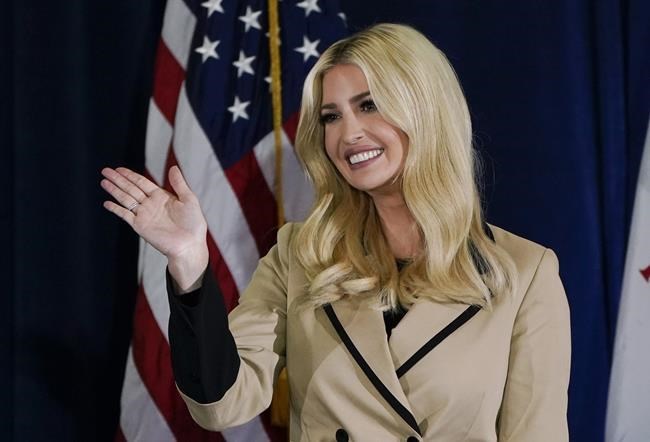WASHINGTON (AP) — The House committee investigating the U.S. Capitol insurrection is asking Ivanka Trump, daughter of former President Donald Trump, to voluntarily cooperate with its probe.
The committee sent a letter Thursday requesting a meeting with Ivanka Trump, who served as an adviser to her father, in early February. In the letter, committee chairman Bennie Thompson says she was in direct contact with her father during key moments of Jan. 6, 2021, when Trump supporters stormed the Capitol in an effort to halt certification of Joe Biden's presidential win.
The committee says it wants to discuss what Ivanka Trump knew about her father’s efforts to pressure then-Vice President Mike Pence to reject the 2020 election results — including a telephone call they say she witnessed — as well as concerns that she may have heard from Pence's staff, members of Congress and the White House counsel’s office about those plans.
The panel cited testimony that Ivanka Trump implored her father to quell the violence by his supporters and said it wants to ask about her actions while the insurrection was underway.
“Testimony obtained by the Committee indicates that members of the White House staff requested your assistance on multiple occasions to intervene in an attempt to persuade President Trump to address the ongoing lawlessness and violence on Capitol Hill," Thompson writes.
The letter is the committee's latest attempt to seek information from inside the Trump family as it has broadened its investigation. Earlier this week, it issued subpoenas to Rudy Giuliani and other members of Trump’s legal team who filed bogus legal challenges to the 2020 election that fueled the lie that race had been stolen from the former president.
The committee is narrowing in on three requests to Ivanka Trump, starting with a conversation alleged to have taken place between Trump and Pence on the morning of the attack. The committee said Lt. Gen. Keith Kellogg, Pence's former national security adviser, was also in the room and testified to the committee that Trump questioned whether Pence had the courage to delay the counting of the votes.
“You were present in the Oval Office and observed at least one side of that telephone conversation,” the letter states. “The Select Committee wishes to discuss the part of the conversation you observed between President Trump and Vice President Mike Pence on the morning of January 6th.”
Besides the subpoena issued this week, the committee received a major win Wednesday night when the Supreme Court rejected a bid by Trump to block the release of White House records sought by the committee, clearing the way for their release.
The National Archives began to turn over the hundreds of pages of records to the nine-member panel almost immediately. They include presidential diaries, visitor logs, speech drafts and handwritten notes dealing with Jan. 6 from the files of former chief of staff Mark Meadows.
The House committee’s investigation has touched nearly every corner of Trump’s orbit in the nearly seven months since it was created, from Steve Bannon to media companies like Twitter, Meta and Reddit.
The panel says it has interviewed nearly 400 people and issued dozens of subpoenas as it prepares a report set for release before the November midterm elections. Still, the committee has run into roadblocks from some of Trump’s allies, including Bannon and Meadows, who have refused to fully cooperate with the lawmaker’s review. Their resistance has led to the panel filing charges of contempt of Congress.
The lawmakers on the panel — seven Democrats and two Republicans — have also faced defiance from members of their own chamber. House Minority Leader Kevin McCarthy and GOP Reps. Scott Perry and Jim Jordan have denied the committee’s requests for voluntary cooperation.
While the committee has considered subpoenaing fellow lawmakers, that would be an extraordinary move and could run up against legal and political challenges.
The committee says the extraordinary trove of material it has collected — 35,000 pages of records so far, including texts, emails and phone records from people close to Trump — is fleshing out critical details of the worst attack on the Capitol in two centuries, which played out on live television.
The next phase of the investigation will be more public-facing, starting with a series of public hearings in the coming months.
Jill Colvin And Farnoush Amiri , The Associated Press



